BUY IT AT AMAZON: CLICK HERE!
STUDIO: Kadokawa
MSRP: $29.98
RATED: Various
The
Kadokawa name umbrellas over a vast media empire in
books. As with any large publishing house, there’s bound to be quite a bit of
chaff around the gems. The gems might reasonably include the Gamera
films, or the Zatoichi series. The chaff includes, well…
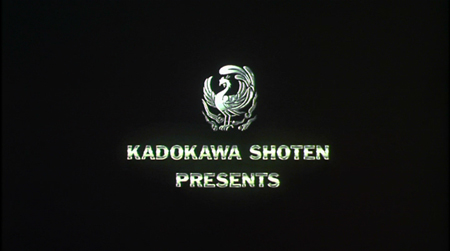
A rooster being attacked by meteors?

Inugami
RUNNING TIME: 105 min.
SPECIAL FEATURES: None
The Nutshell
Deep in
the dark forests of modern-day
evil…
Hillbillies!
Okay,
they’re Japanese hillbillies, and they drink sake instead of Pabst, and they
have all their teeth, but still — real, honest-to-god outsider-hatin’, tradition-lovin’,
sister-fuckin’ hillbillies. There are also possibly some weird dog-creatures
and some religious fervor. But mostly hillbillies.
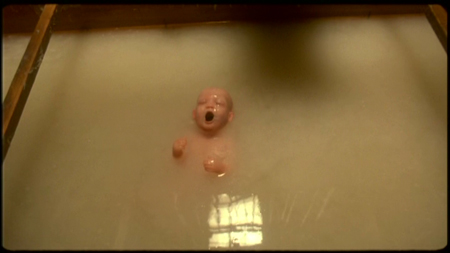
For the last time, horses are not the secret ingredient in every batch of Elmer’s!
The Lowdown
Religious
trappings make their way into some of the finest horror films, in degrees from The
Texas Chain Saw Massacre to The Wicker Man to The
Exorcist. My pet theory is this is because religion and horror both
exploit the same part of the brain that responds to the cautionary tale. But
while we have been often warned of the dangers of Catholics and overbearing
Southern Protestants, we haven’t been exposed much to the horrors of the
Japanese religion of Shintoism, or ancestor worship.
Fear not
(or do,) because Inugami is here to let you in on the little secret. The plot
revolves around an outsider’s penetration into a secluded, rural town high in
the mountains. This town has been the home of a certain Japanese family that
you’re better of thinking of as the "Bonaroos," because their real
name cramps my fingers. The Bonaroos have a ritual of ancestor worship that
mustn’t be disturbed. The women of the Bonaroos are also cursed by the inugami, or dog spirits.
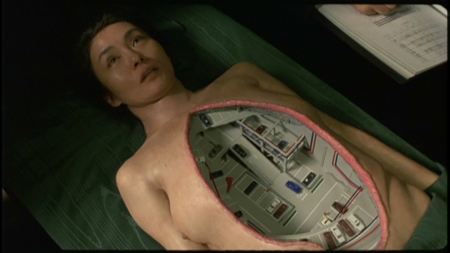
"Gonna park my car / In your garage!"
That’s
the first ten minutes or so of the film. The remainder is a cross between
half-assed Shakespearian family drama and unworthy "gotcha" moments. It
seems that one of the Bonaroos had a baby she shouldn’t have, because she made
it with her (adopted) brother. Well, in a dramatic spoiler, that baby also ends
up having some sexual relations with that poor, tormented Bonaroo. Everything
gets happily resolved in a black-and-white murder/suicide sequence.
I’m
prepared to say that the drama doesn’t work. The threads of the plot are far
too frayed to weave into a complete picture, and the characters do not provide
the audience with significant anchors for their attention. An unusual
structure, which eliminates either the presence or the humanity of the two
protagonists right at the beginning of the third act, leaves a disinterested fog
over the whole, messy proceeding.
But, hey,
I learned that an inugami may be
formed by burying a dog up to its neck in sand, placing food around it, and
then letting it get royally pissed off
as it slowly dies of starvation. The More You Know.
The Package
Not a
thing! Vanished, or, like the coherence of this plot, it never was.
3 out of 10

RUNNING TIME: 101 min.
SPECIAL FEATURES:
• Making-of featurette
• Trailer
The Nutshell
We’ve had
plenty of stories in which lovers or family try to resurrect their dead
whatever, only to have Little Zombie Johnny chomp a cautionary moral into their
flesh. Here’s a twist: on the isolated
their old village and learn that the third member of their little Musketeer
group had died many years previous. Now, her grieving, spiritual mother has
decided to turn the entire island into a land of the dead so her dear daughter
will have some place to be comfortable. Mumsie goes a bit overboard sometimes, but
she’s really sweet at heart, and loves her son Norman.
The Lowdown
Stupid gr’ups
always lose sight of the things that really terrify a child. Monsters in the
closet don’t mean much to someone who, say, uses an arc-welder during the day. Shadows
on the wall just make us horny. So, there’s a small subset of horror films that
dearly love trrying to impress the irrational fears of youth onto
poorly-developed adult minds, as if to say, "You didn’t learn it the first
time around, so we’ll give it another go."
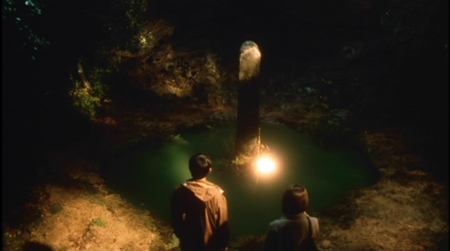
Do they have Freudian literary criticism in Japan?
This kind
of creepy nostalgia is the overriding focus of
serves the story not at all. You know how pissed off you get at children in
movies who do stupid things, just because they’re children? ("No, Ofelia,
don’t eat that testicle-sized grape!") Yeah, it’s all the more annoying
when storytellers decide to impress the same actions on adults, using the same
disregard for basic motivation. The protagonists of
at crazy angles whenever they hit an obstacle.
The
progress through the plot is, unsurprisingly, a series of uncomfortable jolts
with nothing in terms of mood to smooth the passage. In concept,
I’d be happy never to think about it again as anything more than the germ of an
idea.
The Package
There’s a
making-of with some great location scenery; the cinematography is the only
thing I can recommend about the movie. You also get a gallery of trailers and
TV spots.
2 out of 10

Shadow of the Wraith
RUNNING TIME: 117 min.
SPECIAL FEATURES: None
The Nutshell(s)
Really a
pair of linked hourlong features, Shadow of the Wraith concerns strange
phenomena in the lives of teenagers. In the titular segment, a hot young bass
player is tormented by the spirit (or doppelganger) of the bookworm in his
class, who terminates pretty much everything with extreme prejudice.
In the
second segment, "The Hollow Stone," we find that ghosts and spirits
are outrageously ordered creatures and prefer to wreak their general vengeance
in order of ascending integers.

Well, okay, but only because you asked for it.
The Lowdown
We’re
generally not too kind to American remakes of Japanese horror movies. We often
have good reason. For a spate of the more recent ones, it’s because they get
spun down to appeal to a teenage audience, and feature young, impossibly
good-looking stars with very little in the way of acting ability or experience.
(I’m thinking specifically Christina Milian in last year’s remake of Pulse;
feel free to supply your own example from the herd.)
Good
news! It’s not a purely American affliction. As my co-writer and all around
know-it-best Alex Riviello mentioned recently, part of the reason our American
remakes are sucking is because their source material has precious little in the
way of legitimate content. Enter Shadow of the Wraith, starring a
pair of pop-star sisters from the land of the rising sun: Hitomi and Asumi
Miwa! They’re hot and they can act, providing their roles demand emotional
displays at a level that would fail the Turing test.
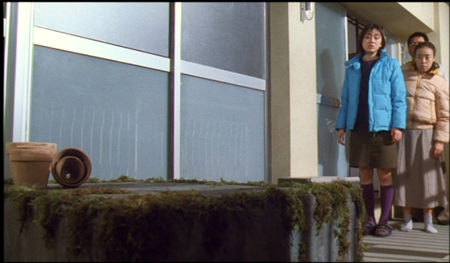
"Isn’t this a strange, moss-covered rock?" KAPONG!
The plot
of the first segment is jammed with pretty teens, pop music interludes, an
after-school special moral, and a plot so thin you can see the stretch marks
through it. It’s maddeningly banal, which is not a quality that meshes well
with horror. Also, freshman film-school level camera fuckery abounds: overuse
of zoom lens, colored filters, and grainy stock makes a look that’s far more
blunt than the intended edgy.
The
second story, "The Hollow Stone," is markedly better, but only
because it shows some restraint with its material, and allows for tension to
build. The story is still thin, but the way the plot conveys it is much more
sure, and less obtrusive.
The two
stories intersect to a degree, but end up feeling like a weightless double
feature. With the female leads given so much focus, it’s really nothing more
than idol exploitation.
The Package
I feel
confident saying that my own package contains more content than does this.
2 out of 10

Isola
RUNNING TIME: 93 min.
SPECIAL FEATURES:
• Interviews w/ cast
• Making-of featurette
• Theatrical trailer
The Nutshell
In the
aftermath of the
psychic woman travels to the stricken city to volunteer as an aid worker. There
she encounters the hostility and thick tension of the survivors of the
disaster, as well as a note of persistent fear. It seems there is a killer
loose in the city, one who just happens to be able to blend in with the
citizens, because she is one of thirteen personalities inside a girl with
multiple personality disorder.

Art shouldn’t be so literal, kid. You have to feel it.
The Lowdown
I’ve
always had the mild impetus to investigate stories that are set in and around
natural disasters. There are plenty of true stories contained in those
situations, but the events have a natural metaphorical weight that extends ever
further beyond their historical reach. Isola makes good use of its setting,
returning to its imagery often to ground the plot and make references that
extend beyond the characters.
Unfortunately,
the characters are patently ridiculous, and incapable of overcoming themselves.
A psychic meets a kid with multiple personality disorder? Identity meets Ghost
with all the wretched plotting and soppy good intentions that the combination
implies. At times the pairing almost seems to have that transcendent weirdness
that has worked so well for other Japanese artists (such as Miike, or Junji Ito
in the comics world), but it never actually transcends
anything, which makes it more like an Icarus device.
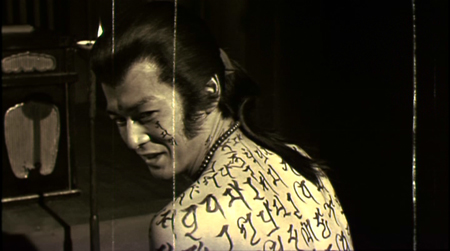
It says: "If you can read this, I’m probably scoring with your wife."
Isola is a mild success on some of its
lower levels, such as with its steady and dreamlike direction, but it possesses
too much self-importance (springing from the setting) and too little of the
self-consciousness necessary in such an odd-couple pairing to give the horrific
aspects of the story any authority.
The Package
Interviews
with some of the cast members reveal little about production that the studio
wouldn’t carefully vet; a making-of featurette salutes the dead of
off.
4.5 out of 10
Overall: 3 out of 10
